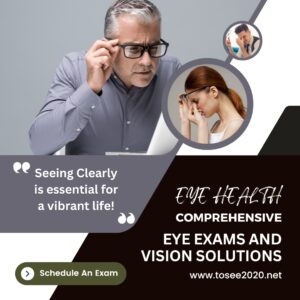Unlocking Clear Sight: The Vital Role of Comprehensive Eye Exams in Early Issue Detection for Lifelong Eye Health
Our eyes are one of the most vital sensory organs, allowing us to perceive the world around us. However, many of us take our vision for granted, failing to recognize the importance of regular eye exams. Eye exams are not just a formality; they are crucial in maintaining ocular health and detecting potential issues before they escalate into serious problems. In this article, we will explore the significance of eye exams, the various components of a comprehensive eye exam, and their potential benefits in safeguarding our vision and overall well-being.
Understanding the Importance of Eye Exams:
Routine eye exams are essential for people of all ages, as they are the most effective way to ensure optimal eye health. The human eye is a complex and delicate structure, susceptible to various conditions and diseases that can lead to vision impairment or even blindness if left untreated. Eye exams are not just about getting a new prescription for glasses or contact lenses; they are comprehensive assessments performed by qualified eye care professionals to assess the eyes’ overall health and detect any potential issues.

Early Detection and Prevention:
One of the most significant advantages of regular eye exams is their ability to detect eye conditions and diseases in their early stages. Many eye conditions, such as glaucoma, diabetic retinopathy, and macular degeneration, may not present noticeable symptoms in their initial stages. However, an eye exam can identify subtle changes or abnormalities that might indicate the presence of these conditions. Early detection allows for timely intervention, increasing the chances of successful treatment and preserving vision.
Eye exams can also help in preventing eye issues from developing or worsening. For instance, a comprehensive eye exam can reveal signs of digital eye strain, commonly caused by prolonged screen time, and offer recommendations to alleviate the stress and protect the eyes.
Assessing Vision Changes:
Vision changes can occur gradually over time, making recognizing the decline in visual acuity challenging. Regular eye exams can help monitor and assess any vision changes, allowing eye care professionals to promptly update prescriptions for corrective eyewear. Maintaining clear vision enhances the quality of life and promotes safety, particularly while driving or operating machinery.
Read More About : Common Causes Of Dry Eye Syndrome | Best Treatment Option From Eye Doctor Near Lisle
Identifying Systemic Health Conditions:
Believe it or not, eye exams can offer valuable insights into your overall health beyond just eye-related issues. The eyes’ blood vessels and tissues provide a clear view of the body’s blood vessels and can show signs of systemic health conditions. For example, during an eye exam, an optometrist may detect symptoms of diabetes or hypertension, prompting further evaluation and early management of these conditions. Consequently, eye exams are an essential screening tool for various systemic health issues, contributing to comprehensive healthcare.

Components of a Comprehensive Eye Exam:
A comprehensive eye exam typically involves various assessments and tests to evaluate ocular health and visual function. The components of a comprehensive eye exam may include:
-
Visual Acuity Test:
- This test measures the clarity of your vision at various distances and is usually performed using an eye chart.
-
Refraction Test:
- The refraction test determines the right prescription for your glasses or contact lenses by assessing how your eyes focus light.
-
Tonometry:
- Tonometry measures the pressure inside the eye and is crucial for detecting glaucoma, a condition that damages the optic nerve.
-
Slit Lamp Examination:
- This examination allows the eye care professional to examine the structures of the front of the eye, including the cornea, iris, and lens.
-
Dilated Eye Exam:
- During this procedure, eye drops widen the pupils, allowing for a more thorough examination of the retina and optic nerve.
-
Visual Field Test:
- The visual field test assesses your peripheral vision and can help detect early signs of glaucoma and other neurological conditions.
-
Fundus Photography:
- Fundus photography involves capturing retina images to monitor and document any changes or abnormalities.
Benefits of Regular Eye Exams:
-
Early Detection and Treatment:
- As previously mentioned, early detection of eye conditions and diseases leads to timely treatment, preserving vision, and preventing further damage.
-
Preventing Vision Loss:
- Regular eye exams can prevent vision loss by identifying issues early and providing appropriate interventions.
-
Maintaining Eye Health:
- Routine eye exams contribute to overall eye health and can prevent minor issues from turning into major problems.
-
Updating Prescriptions:
- Keeping your vision prescription up to date ensures you enjoy clear and comfortable vision.
-
Managing Eye Strain:
- Eye exams can help identify and address digital eye strain caused by excessive screen time or other visual stressors.
-
Monitoring Systemic Health:
- Eye exams can reveal signs of systemic health conditions, prompting early intervention and preventing complications.
Conclusion:
Regular eye exams are more than just an optical check-up; they are vital for maintaining ocular health, detecting potential issues early, and safeguarding our vision. Through comprehensive assessments, eye care professionals can identify and address various eye conditions and diseases, ensuring timely treatment and preventing further damage. Moreover, eye exams can serve as a window to our overall health, enabling the early detection of systemic conditions that may otherwise go unnoticed. To protect our precious gift of sight and general well-being, we must prioritize regular eye exams and embrace their power to detect and prevent issues before they escalate.
